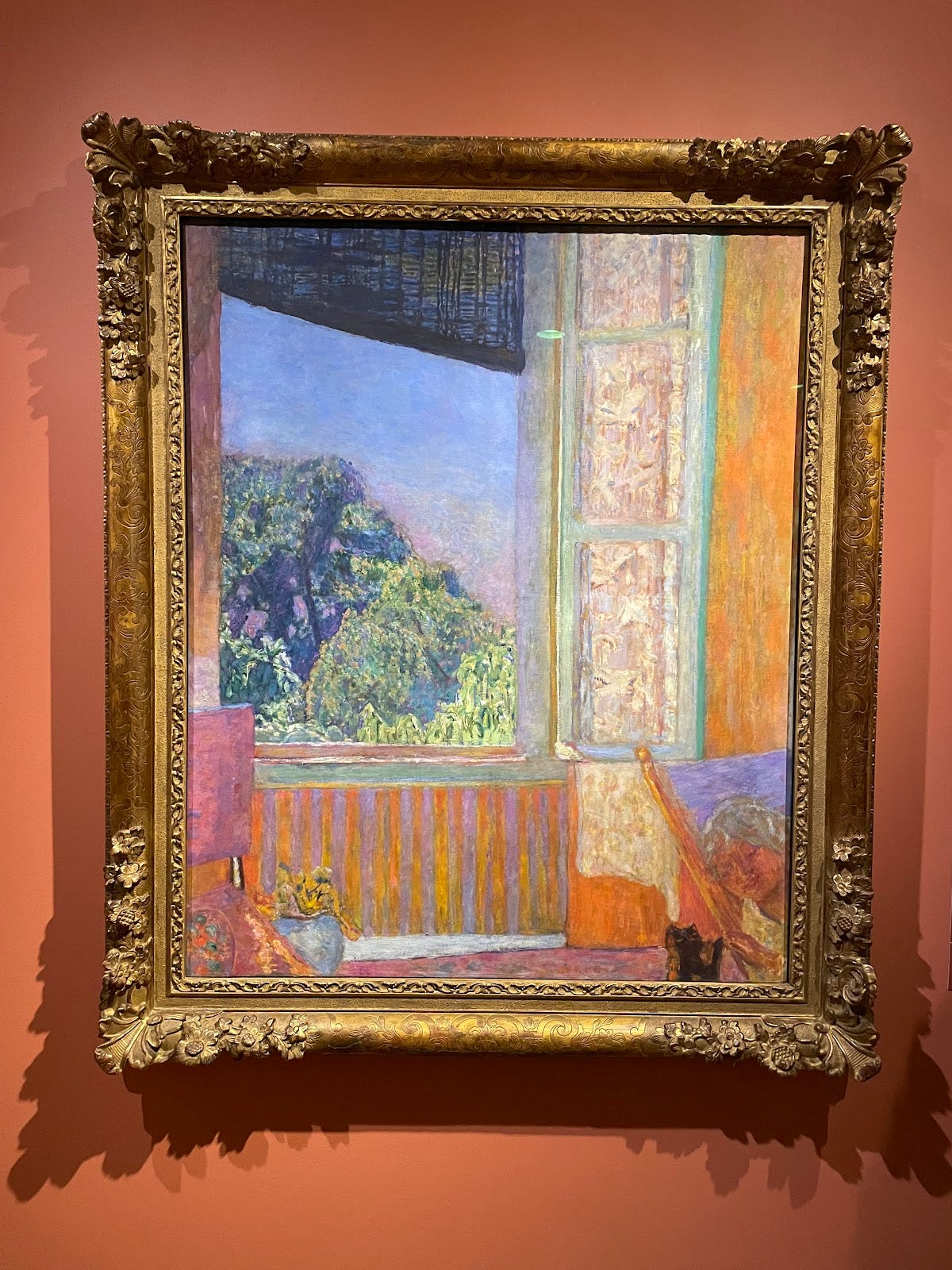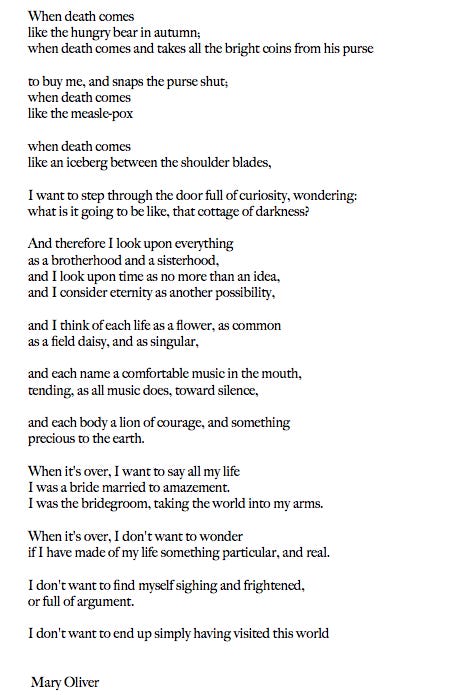'Consider Eternity'
On Wonder & Mortality
Welcome to Muhajir, a newsletter about what moves me. If you’ve opened this before and enjoyed reading, please consider subscribing:
I like to joke that I’ve found the meaning of life and that it’s going on little walks. My most-traveled route home, either on bike or foot, contains a number of wonders. There’s a playground and dog park to smile at before I go over a bridge that overlooks Rock Creek Park and its resident bike trails. In the summer and fall, the view of the trees stretches as far as my eyes can see, and in the winter, without leaves to obscure, I can stand and watch people biking up and down the protected bike trails. I stand around long enough to feel jealous of the children on cargo e-bikes who are being ferried around by their parents, adjacent to streams and lurking deer. Further on the journey, right before I get to my house, there is a church with a bench under a tree. It is one of those benches that are adaptable to any mood, anything from melancholy to romance.
I grew up in a dense and loud megacity, and so the fact that I sometimes see urban wildlife on my bike rides home is nothing short of miraculous to me. I know that most people are not particularly inspired or even interested by deer sightings in the Northeast, but, for me, each one is a profound experience. This is important because I spend a lot of my waking time thinking about what the internet calls The Horrors. My entire job is horror-focused: thinking and writing about war economies and war profiteering and war crimes. And then I spend much of my free time thinking about the same things. I’m not really interested in changing this about myself, and I’m not sure I could even if I tried, but I do welcome the distractions my life presents me.
Last week, I wrote about grief and how sighting some cardinals put the grief into perspective, and I felt very dramatic about it. A couple of small birds hanging out is hardly a story worth telling. But, in fact, not a single bird has even come near the clay dish and its contained water since then. So you can see how I might be inspired to be dramatic.
However, to go back to the walks: they have to do with my mortality. I’m certain that many among us have experienced gazing at the night sky or mountains or the oceans and been struck by the finitude and smallness of their existence. My walks are not nearly as awe-inspiring. And they do not make me feel small. They remind me of the fragility of us and our environments, of how we are so connected. Last week, I saw a dead sparrow on the sidewalk outside my home. I had to put away my bike before attending to it, and by the time I had returned, someone had moved the tiny corpse out of the way, onto a pile of mulch and leaves under a tree. I picked up a few handfuls of leaves and dirt to bury the sparrow, thinking of how I and this unknown person had worked in tandem to keep this fragile body from being trodden underfoot.
Jeff VanderMeer, author of several novels including the Southern Reach trilogy, is a devout environmentalist and spends much of his time trying to rewild his corner of the world (Florida). When he came to DC last year, he talked a lot about his environmentalism and how that influenced his writing. During the Q&A, someone stood up to ask him how he stays hopeful even though “we are all so fucked.” I was torn on whether I thought this was a good question, even though I was interested to hear Jeff’s response. I suppose I don’t really find that there’s much of an alternative to staying hopeful, as the only other path is individualism and delusion. Jeff had a better response. He reminded the asker to consider scale. The raccoons that find safe haven and shade in Jeff’s rewilded yard have a lifespan of approximately two years. The bees doing the same generally live for about six weeks. Jeff’s efforts will improve their entire lives. He may even improve generations of their lives.
I am trying, when I beekeep or put water out in the summer, to do something similar. But it, more often, feels like the animals and bugs are improving my entire life and they are quite unimpressed by my overtures to them.
Last winter, I was illegally on a bike trail after it closed at sunset. It was dark in the way it only can be at 9 pm in the winter, and I couldn’t feel my fingers. I was only two minutes from home when I saw the eerie and reflective glow of animal eyes and had to abruptly stop biking because there were deer on the trail. I was pretty giddy with the excitement of having four deer (one baby!) so close to me, but also couldn’t figure out why they were so unbothered by me. They didn’t move for ages, and I eventually had to walk my bike off-trail and around them. Like the cardinals, it felt akin to a hallucination, or perhaps a message.
Kaveh Akbar, on one episode of VS, talks about how a poet’s job is the interrogation of wonder. Wonder, in all its glorious mundanity. You can’t be moved to wonder by the natural world, though, if you fail to consider your mortality. Mary Oliver and Ross Gay’s work depends on this. Both examine nature and our relationship with it, and both seem to say: since you will surely die, look at, and think about, this stream/tree/goose/cloud. All of Gay’s meditations on joy, gratitude and delight are informed by a deep sorrow. Nearly every poem in a Catalog of Unabashed Gratitude is an elegy. Oliver’s work sometimes may seem that it is about gratitude and nature, rather than death, but one of her poems makes it quite clear how death underpins her work:
I’ve always thought about my death a lot, partly because I used to want to cause it. This, while morbid, has made me really wonder what I want to be able to look back on, at the end. I do, like Oliver, want to be a bride married to amazement. And I think the difficulty of this marriage is it forces one to really look. Ross Gay often mentions in interviews that he feels disappointed that people see him as a happy poet or “the delights guy.” He feels that this is not only a misreading of his work, but an intentional misreading, one that stems from an immature relationship with life, and a desire to get out of the relationship. So I guess I’m talking about my walks to talk about my attempts to look and to have the relationship that may lead to my marriage to amazement.






Beautiful Piece! This is obviously something that crosses my mind alot as well. I don’t exactly think that there is exactly all that much of a need to have an over arching meaning to life. Because whether we like it or not, we’re not here for very long and we’re one of so many billions. Not everyone is meant to change the world and that’s okay! Its such a privilege on its in own to be able to enjoy the world, taste and savor nice things and let your mind run free!
Another beautiful piece and I so resonate with it. I also spend my days studying, teaching, and immersing myself in the worst of the things people do to each other and the world, feeling dismay and disappointment and often fury and despair, yet still, regularly, I get shocked into delight, solace, wonder, and joy. Right now it's in the owl who's hooting nights and early mornings, the half moon still bright as the sky lightens, the lizards running skittishly across the patio, the incredibly heady sweet smell of the pittosporum that's dropping its blossoms into drifts, a kindness or gentleness or generosity. My kids used to mock me for how frequently on a drive I'd suddenly cry out: look at the pretty grass! look at the clouds! I see a vulture/hawk/blue jay/name-a-bird! Unlike Oliver, I don't anticipate a door opening into another world after this one, so it holds all of my emotions and they are as ephemeral as the rest of it.